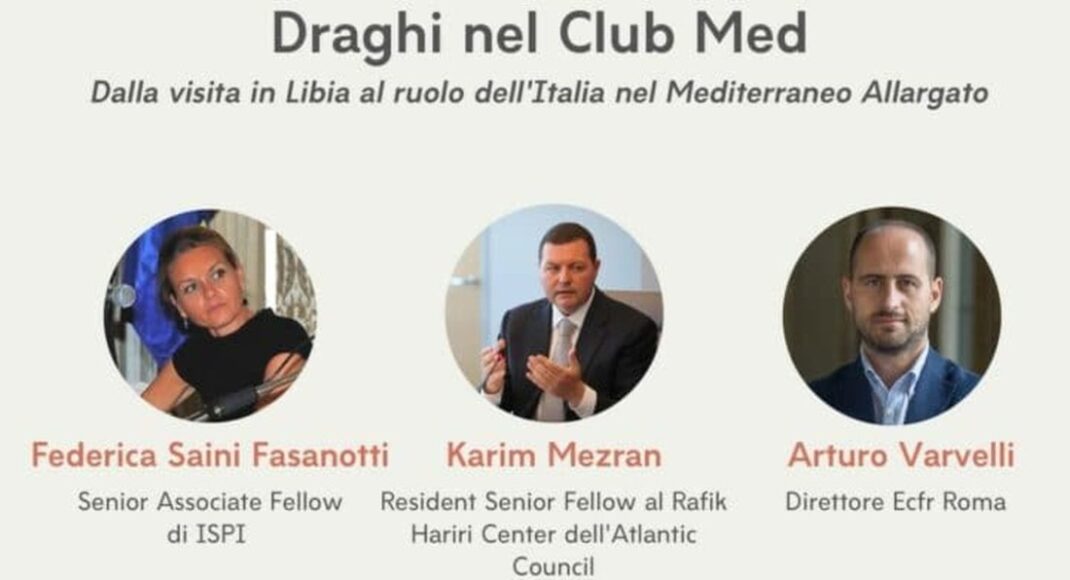By Otto Lanzavecchia|
 A fragile balance threatened by military groups, a torn socio-economic fabric and elections on the horizon. Formiche’s live talk with Saini Fasanotti (Brookings / ISPI), Mezran (Atlantic Council) and Varvelli (Ecfr) on the role of Draghi’s Italy in Libya.
A fragile balance threatened by military groups, a torn socio-economic fabric and elections on the horizon. Formiche’s live talk with Saini Fasanotti (Brookings / ISPI), Mezran (Atlantic Council) and Varvelli (Ecfr) on the role of Draghi’s Italy in Libya.
The visit of Prime Minister Mario Draghi in Libya prelude to what will hopefully be a period of reconstruction, also favored by Italy, but the path to stability is arduous and undermined. Many objectives, many variables, many actors (including external ones) who remain in the wings of a theater marked by a decade of conflict.
Formiche’s latest live talk focused precisely on what is the best way to follow, on the western side, to ensure that Tripoli does not fall back into chaos.
Federica Saini Fasanotti , Senior Associate Fellow of ISPI and Brookings Institution, spoke of a “heavy discrepancy between what is happening at the political level and what is happening in the area“.
On the one hand the meetings at the highest levels, on the other the non-withdrawal of international troops – more or less irregular – and the presence of local militias, not disowned and sometimes even legitimized from above and integrated into the institutions, which “break up” the social fabric and encompass the future of young people (half of the 6 million Libyans are under 25).
The international parties permanently settled in Libya are Russia (hidden behind the Wagner Group, a group of military contractors often hired by the Kremlin), the Emirates and Egypt on the Cyrenaic side, Turkey and Qatar on the Tripoli side, which in turn is supported (politically) by the UN, the EU and the USA.
“As long as [the foreign forces] are still and inactive they can also be a stabilizing element,” commented the expert, “but they can explode, with disruptive effects in the political sphere and disrupting social reality“.
For Arturo Varvelli , director of the Rome office of the European Council on Foreign Relations (Ecfr), the possible decision to get the external powers out of the Libyan territory would be taken in Ankara, Moscow, Brussels or even Washington, after negotiations and sales between the major international players. The Libyan conflict is in effect a proxy war , he remarked.
The Turks, for example, have well-rooted historical interests and ties in Tripoli, where they were present even before the hostilities; “More worrying” the presence of the Russians, a truly “foreign” body in that corner of the Mediterranean, said the director.
For structural limits, Europe does not have the forces to face Moscow, but it could have it together with the United States, which has returned to the game (albeit from a distance) with the presidency of Joe Biden .
According to Karim Mezran , Resident Senior Fellow of the Atlantic Council, the European states have helped to prepare the background for the transition from the military to the political moment, but the turning point took place in 2019 in the military field, with the Turkish intervention in support of the Tripoli forces, without which the capital would probably have fallen into the hands of General Haftar’s Cyrenaic forces .
Thus the European inactivity, concretized in the ineffectiveness of the Irini naval mission (which supports the arms embargo on Libya in the Mediterranean but does nothing for the equipment that arrives, via Egypt or by air, to the Cyrenaics), becomes a burden on the credibility of the States of the Union.
As well as some political ambiguities, such as France sided for years with the Cyrenaic faction, the institutional meetings between the government of Giuseppe Conte and Haftar and the conflicting visions between Rome and Paris that have actually caused the inertia of the entire Union.
“The best thing Italy could do was keep the embassy open“, commented Mezran, highlighting the essential and proactive role played by Ambassador Giuseppe Buccino in preventing the negative vision of Italy from taking hold among Libyans. .
This is why Draghi’s Italy (towards which the Libyan political class is not hostile) remains the ideal candidate to move the long-standing Euro-Atlanticist manus in support of Tripoli.
Also because, as Saini Fasanotti pointed out, Americans are happy to leave the Mediterranean situation in the hands of Europe in view of their domestic and international priorities.
Varvelli spoke of a “very positive realignment” in Europe, especially between France, Germany and Italy, after years of deleterious ambiguity responsible for the geopolitical vacuum in which foreign powers have slipped.
Draghi can be the Western reference point because at the domestic level his government of national unity facilitates a truly bipartisan foreign policy, while at the international level he enjoys excellent credibility with the US and European countries – very important, in the year in which Angela Merkel leaves helm of Germany and Emmanuel Macron is preparing to face the elections in France.
Now it is up to Italy to transform the analysis it is capable of into political action, the expert said.
It is therefore a question of coordinating the European effort to better support Tripoli. The priorities that emerged from the live talk begin with the Libyan elections scheduled for December 24, to be encouraged and legitimized with a European technical mission.
“Academically speaking, the elections are a mistake because they will crystallize the divisions that already exist”, commented Mezran; “But you have to do them at all costs because they are the only way in which the Libyans can become passionate about politics” and restart the democratic process.
Stability also passes through the strengthening of the Irini mission (which must increase the eyes in the sky and the efforts more generally to avoid penalizing only the Turks, who would also be NATO allies) and the concrete aid to mend the socio-economic fabric of the Libya, whose economy depends 95% on oil exports and is essentially devoid of a private sector; unable, therefore, to absorb new workforce and limit membership of the militias.
“Italy must take action in this sense, we are masters of the private sector and entrepreneurship”, said Saini Fasanotti, “but [its] action must be more incisive”.
__________





